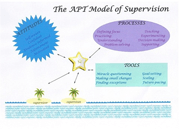Code of Ethics and Practice for the Supervision of Hypno-Psychotherapists
-
Introduction
- The purpose of this Code of Ethics is to establish standards for Supervisors in their supervision work with Therapists, and to inform and protect Therapists seeking supervision.
- Ethical standards comprise such values as integrity, competence, confidentiality and responsibility.
- This document should be seen in relation to the Code of Ethics and Practice for Hypnotherapists.
- Members of the NSTT, in assenting to this Code, accept their responsibilities to hypnotherapists and their clients, their agencies, to colleagues, and to the NSTT
- There are various models of supervision. The code applies to all supervision arrangements.
The Code of Ethics has three sections:
- The Nature of Supervision
- Issues of Responsibility
- Issues of Competence
The Code of Practice has two sections:
- The Management of the Supervision work
- Confidentiality
The Appendix describes different models of Supervision, and comments on issues that may be relevant to particular models.
-
Code of Ethics
B 1. The Nature of Supervision
- The primary purpose of supervision is to ensure that the therapist is addressing the needs of the client.
- Supervision is a formal collaborative process. The term ‘supervision’ encompasses a number of
functions concerned with monitoring, developing, and supporting individuals in their therapy role. [This process is sometimes known as ‘non-managerial supervision or ‘consultative support’.]
- To this end supervision is concerned with:
- the relationship between therapist and client, to enhance its therapeutic effectiveness.
- monitoring and supporting the therapist in the therapist role.
- assisting the therapist to develop his/her professional identity through reflection on the work, in the context of this relationship, which will be both critical and supportive.
- clarifying the relationships between therapist, client, supervisor, and [if any] the organisations
involved.
- ensuring that ethical standards are maintained throughout the therapy work.
- Supervision is therefore not primarily concerned with:
- training
- personal therapy of the therapist
- line management
However, the skills associated with these activities are central to competent supervision.
- The supervisory relationship must by its nature be confidential.
- A therapist should not work without regular supervision.
B.2. Issues of Responsibility
- Given that the primary purpose of supervision is to ensure that the therapist is addressing the
needs of the client:
- therapists are responsible for their work with the client, and for presenting and exploring as honestly as possible that work with the supervisor.
- supervisors are responsible for helping therapists reflect critically upon that work. It is important
that both parties are able to work together effectively.
- Supervisors are responsible with therapists for ensuring that they make best use of the supervision time.
- Supervisors and therapists are both responsible for setting and maintaining clear boundaries
between working relationships and friendships or other relationships, and making explicit the boundaries between supervision, consultancy, therapy and training.
- Supervisors and therapists must distinguish between supervising and counselling the therapist.
They would not normally expect to mix the two. On the rare occasions when the supervisor might engage in therapy with the therapist, a clear contract must be negotiated, and any therapy done must not be at the expense of supervision time.
- Supervisors are responsible for the observation of the principles embodied in this Code of Ethics
and Practice for the Supervision of Therapists, and whichever code of Ethics and Practice their supervisee is working to.
- Supervisors must recognise the value and dignity of therapists as people, irrespective of
origin, status, sex, sexual orientation, age, belief or contribution to society.
- Supervisors are responsible for encouraging and facilitating the self development of others, whilst
also establishing clear working agreements which indicate the responsibility of therapists for their own continued learning and self-monitoring.
- Both are responsible for regularly reviewing the effectiveness of the supervision arrangement, and
considering when it is appropriate to change it.
- Supervisors are responsible for ensuring that the satisfaction of their own needs is not dependent
upon the supervisory relationship, and they should not exploit this relationship,
- The supervisor and therapist should both consider their respective legal liabilities to each other, the employing organisation, if any, and the client.
B .3. Issues of Competence
- Supervisors should continually seek ways of increasing their own professional development, including, wherever possible, specific training in the development of supervision skills
- Supervisors must monitor their supervision work and be prepared to account to their therapists and colleagues for the work they do.
- Supervisors must monitor the limits of their competence.
- Supervisors are strongly encouraged to make arrangements for their own consultancy and support to help them evaluate their supervision work.
- Supervisors have a responsibility to monitor and maintain their own effectiveness. There may be
times when their personal resources are so depleted that they will need to seek help and/or withdraw from the practice of supervision, whether temporarily or permanently.
- Therapists should consider carefully the implications of choosing a supervisor who is not a practising therapist. This applies especially to inexperienced therapists.
-
Code of Practice
- Introduction
This Code of Practice is intended to give more specific information and guidance regarding the implementation of the principles embodied in the Code of Ethics for the Supervision of Therapists.
- The Management of the Supervision Work
In order to establish an effective supervision contract, the following points should be considered:
- Supervisors should inform therapists as appropriate about their own training, philosophy and theoretical approach, qualifications, and the methods they use.
- Supervisors should be explicit regarding practical arrangements for supervision, paying particular
regard to the length of contact time, the frequency of contact time and the privacy of the venue.
- Fees required should be arranged in advance.
- Supervisors and therapists should make explicit the expectations and requirements they have of
each other, and each party should assess the value of working with each other.
- Before embarking on a supervision contract, supervisors should ascertain what, if any, therapeutic
or helping relationships the therapist has had, or is currently engaged in. This is in order to establish any effect this may have on the therapist’s therapy work.
- If, in the course of supervision, it appears that therapy or therapy would be beneficial to a therapist, the supervisor should discuss the issue and, if appropriate, make a suitable referral to a third party or agency.
- Supervisors should ensure that therapists are given regular opportunities to discuss and evaluate
their experiences of supervision.
- Supervisors should regularly review how the therapist engages in self assessment and self evaluation of their work.
- Supervisors should ensure that therapists understand the importance of further training experiences, and encourage the therapist’s professional development in this way.
- Supervisors must make sure that therapists are made aware of the distinction between therapy,
accountability to management, consultancy, support, supervision and training.
- Because there is a distinction between line management and therapy supervision, where a therapist works in an organisation or agency, the lines of accountability and responsibility need to be clearly defined, between: therapist/client; supervisor/therapist; organisation/client; organisation/supervisor; organisation/ therapist; supervisor/client.
- Supervisors who become aware of a conflict between their obligation to a therapist and their obligation to an employing organisation will make explicit to the therapist the nature of the loyalties and responsibilities involved.
- Where personal disagreements cannot be resolved by discussion between supervisor and therapist, the supervisor should consult with a fellow professional and, if appropriate, offer to refer the therapist to another supervisor.
- In addition to the routine self monitoring of their work, supervisors are strongly encouraged to
arrange for regular evaluation of their work by an appropriately experienced consultant.
- Supervisors should, whenever possible, seek further training experience that is relevant to their
supervision work.
C 3 Confidentiality
- As a general principle, supervisors must maintain confidentiality with regard to information about
therapists or clients, with the exception cited below.
- Supervisors must not reveal confidential information concerning therapists or clients to any other
person or through any public medium unless:
a] it is clearly stated in the supervision contract that this is acceptable to both parties, or
b] when the supervisor considers it is necessary to prevent serious emotional or physical
damage to the client or another party. When the initial contract is being made, agreement about the people to whom a supervisor may speak must include the people on whom a supervisor relies for support, supervision or consultancy. There must also be clarity at this stage about the boundaries of confidentiality regarding people [other than the therapist] to whom the supervisor may be accountable.
- Confidentiality does not preclude the disclosure of confidential information relating to therapists
when relevant to the following:
a] recommendations concerning therapists for professional purposes.
b] pursuit of disciplinary action involving therapists in matters pertaining to ethical standards.
- Information about specific therapists may only be used for publication in journals or meetings with the therapist’s permission, and with anonymity preserved when the therapist so specifies.
- Discussion by supervisors of therapists with professional colleagues should be purposeful and not trivialising.
-
Appendix
- 1. Models of Supervision
- There are different models of supervision. This appendix outlines the particular features of some of these models.
- One-to-one: Supervisor-Therapist:
This involves a single supervisor providing supervision for one other therapist, who is usually less experienced than themselves in therapy. This is still the most widely used method of supervision. Its long history means that most of the issues requiring the supervisor’s and therapist’s consideration are well understood, and these are included in the Code of Practice above.
- One-to-one: Co-supervision:
This involves two participants providing supervision for each other by alternating the roles of supervisor and therapist. Typically, the time available for a supervision session is divided equally between them.
- Group supervision with identified supervisor[s]:
There is a range of ways of providing this form of supervision. At one end of the spectrum the supervisor, acting as leader, will take responsibility for apportioning the time between the therapists, and then concentrating on the work of individuals in turn. At the other end of the range, the therapists will allocate supervision time between themselves, using the supervisor as a technical resource. There are many different ways of working between these two alternatives.
- Peer group supervision: This takes place when three or more therapists share the responsibility for providing each others’ supervision
within a group context. Typically, they will consider themselves to be of broadly equal status, training and/or experience.
6.Eclectic methods of supervision: Some therapists use combinations of the above models for their supervision.
D .2. Points requiring additional consideration
- Certain models require the consideration of some of the points listed below, that are additional to
the contents of the Code of Practice.
- All the points contained elsewhere within the Code of Practice should be considered.
- Sufficient time should be allocated to each therapist to ensure adequate supervision of the therapy work.
- Some methods are unlikely to be suitable for newly trained or inexperienced therapists, because of the importance of supervisors being experienced in therapy. [eg co-supervision].
- Care needs to be taken to develop an atmosphere conducive to sharing, questioning and challenging each others’ practice in a constructive way. [eg group supervision].
- As well as having a background in therapy work, supervisors should have appropriate groupwork
experience in order to facilitate this kind of group.
- All the participants should have sufficient groupwork experience to be able to engage the group
process in ways which facilitate effective supervision.
- Explicit consideration should be given to deciding who is responsible for providing the supervision,
and how the task of supervision will be carried out.
- It is desirable that these groups are visited from time to time by a consultant to observe the group
process and monitor the quality of the supervision.









 In recognition of the knowledge, experience, training and education in working with survivors of traumatic events and/or crisis management, Shaun was granted Diplomate Status within the American Academy of Experts in Traumatic Stress.
In recognition of the knowledge, experience, training and education in working with survivors of traumatic events and/or crisis management, Shaun was granted Diplomate Status within the American Academy of Experts in Traumatic Stress.
 Since 2001 I have been providing supervision for hypnotherapists in Manchester as well as throughout the UK. Sessions can be face to face, one to one, groups or on Zoom, WhatsApp, SKYPE or FaceTime. I provide supervision in accordance with the requirements for practitioner registered with UKCP, NSTT, NCH, NCPS and HS as well as other professional bodies for hypnotherapy and psychotherapy.
Since 2001 I have been providing supervision for hypnotherapists in Manchester as well as throughout the UK. Sessions can be face to face, one to one, groups or on Zoom, WhatsApp, SKYPE or FaceTime. I provide supervision in accordance with the requirements for practitioner registered with UKCP, NSTT, NCH, NCPS and HS as well as other professional bodies for hypnotherapy and psychotherapy. I have recently completed a specialist certification programme in Clinical Traumatology in order to assist my clients with PTSD more effectively. Trauma work requires specialist training beyond a practitioner's initial training.
I have recently completed a specialist certification programme in Clinical Traumatology in order to assist my clients with PTSD more effectively. Trauma work requires specialist training beyond a practitioner's initial training. I have presented courses, seminars, after dinner speeches and workshops in the UK, Europe, USA, Australia and the Far East on various aspects of hypnosis and psychotherapy. To date, I have presented over 50 programmes at international hypnotherapy and psychotherapy conferences around the world. If you want a dynamic and entertaining after dinner speaker, get in touch.
I have presented courses, seminars, after dinner speeches and workshops in the UK, Europe, USA, Australia and the Far East on various aspects of hypnosis and psychotherapy. To date, I have presented over 50 programmes at international hypnotherapy and psychotherapy conferences around the world. If you want a dynamic and entertaining after dinner speaker, get in touch.